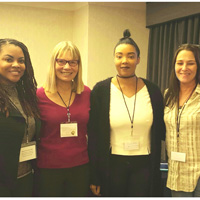Culturally Grounded Approach to Youth Suicide Prevention
March 01, 2016
 Falconer, Stiles, Boney and Bluehen-Unger in Portland
Falconer, Stiles, Boney and Bluehen-Unger in PortlandApplied Educational Psychology faculty and students presented in Portland, Oregon, on their research into youth suicide prevention programs for Native American and African American youth. While many programs treat these populations with the same approach, the Webster academics' study took a culturally grounded approach.
Their presentation, “An Exploration of Culturally Grounded Youth Suicide Prevention Programs for Native American and African American Youth," was based on their paper and was presented at the Feb. 19 conference of the Society for Cross-Cultural Research.
Presenting were Webster students and faculty Rhonda Bluehen-Unger, Jameca Falconer, Deborah Stiles, Ericka Boney and Tammy Grant.
According to the Centers for Disease Control, suicide is the second leading cause of death for native youth and the third leading cause of death for African American youth in the 15- to 24- year-old age group. Many programs intended to prevent suicide in youth take a “one-size-fits-all" approach; a few seek to culturally “tailor” existing programs to fit the needs of a specific youth population.
These faculty and students took a culturally grounded approach. their exploratory study recommends that suicide prevention programs for African American youth should incorporate family, environmental factors and religion in order to be effective. Meanwhile, they recommend that suicide prevention programs on reservations shouldn’t only focus on the individual at risk, but take a larger view including ways of life, the family, the community, spirituality, and belief systems.
